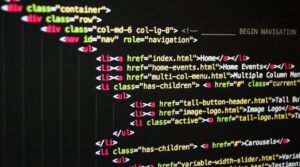Artificial Intelligence Film Industry
Artificial intelligence (AI) has made significant advancements in recent years, revolutionizing various industries. From healthcare to finance, AI has proven to be a game-changer. Another field that has leveraged the power of AI is the film industry. With the ability to analyze vast amounts of data, predict audience preferences, and even generate scripts, AI is reshaping how movies are made and consumed.
Key Takeaways
- AI is transforming the film industry through data analysis and creativity.
- AI-powered algorithms can predict audience preferences and optimize marketing strategies.
- AI-generated scripts have sparked debates about creativity and artistry in filmmaking.
- Virtual reality and AI are blending to create interactive movie experiences.
The Impact of AI on Filmmaking
AI has significantly impacted the filmmaking process. By analyzing large sets of historical data, AI algorithms can predict which genres, actors, and storylines are most likely to attract audiences. *This predictive power helps studios make informed decisions when creating and marketing their films.* Moreover, AI can assist in editing by recognizing patterns and identifying the most visually appealing scenes, making the post-production process more efficient.
In addition to data analysis, AI is already capable of generating full movie scripts. Although controversial, AI-generated scripts have the potential to reduce costs and provide fresh stories that might not have been considered by human screenwriters. *This sparks a debate about the fine line between human creativity and the capabilities of AI.*
The Role of AI in Audience Engagement
AI technology plays a critical role in optimizing audience engagement and marketing strategies. By analyzing social media data, AI algorithms can assess audience reactions to trailers, promotional materials, and even test screenings. Based on these insights, the marketing campaigns can be tailored specifically to target the right audience and ensure the film’s success.
Furthermore, AI-driven recommendation algorithms have become an essential component of streaming platforms like Netflix and Amazon Prime Video. By analyzing a user’s viewing history and preferences, AI can suggest personalized movie recommendations, improving user experience and increasing viewership.
The Future of Filmmaking: AI and Virtual Reality
As technology continues to advance, AI and virtual reality (VR) are converging to create immersive and interactive movie experiences. Using VR headsets and AI algorithms, viewers can now navigate through virtual movie worlds, interact with characters, and even influence the storyline. This blend of AI and VR opens up a new dimension for filmmakers to explore and create innovative storytelling techniques.
AI can also assist in the production of VR films by automating certain tasks, such as scene recognition or visual effects. With AI’s ability to generate realistic visuals, filmmakers can create virtual environments that are indistinguishable from reality, expanding the possibilities for storytelling.
Summary Table: Role of AI in Film Industry
| Area | Applications |
|---|---|
| Scriptwriting | AI-generated scripts, collaborative writing tools |
| Marketing | Audience analysis, personalized promotions |
| Editing | Visual scene recognition, post-production optimization |
Data Table: Successful AI-Driven Films
| Movie | AI Application |
|---|---|
| The Next Rembrandt (2016) | AI-generated painting based on Rembrandt’s style |
| It’s No Game: A Pokémon GO Costume Designer (2019) | AI-assisted costume designs for Pokémon GO users |
| α-Go (2017) | AI-written screenplay for a short film |
The Evolution Continues
The marriage of AI and the film industry demonstrates the immense potential for innovation and creativity. As AI technology continues to advance, filmmakers will have more tools at their disposal to create compelling stories and engage audiences on a deeper level. *The impact of AI on the film industry will continue to evolve and shape the future of filmmaking.* Whether it is through predictive analysis, script generation, or immersive VR experiences, AI has undoubtedly made its mark on the silver screen.

Common Misconceptions
Misconception 1: AI will completely replace human actors in films
Contrary to common belief, the use of AI in the film industry does not mean the complete replacement of human actors. While AI has certainly made advancements in areas such as voice replication, CGI, and special effects, human actors bring emotions, improvisation, and nuanced performances to the screen that AI cannot replicate.
- AI enhances human performances
- Human actors provide authenticity and relatability
- AI cannot perfectly mimic human emotion
Misconception 2: AI will independently create films without human involvement
Another common misconception is that AI has the capability to autonomously create films without any human involvement. While AI can assist in various aspects of the filmmaking process, such as scriptwriting and scene generation, it still heavily relies on human input and creativity.
- AI tools are collaborative tools for filmmakers
- Human creativity and decision-making are essential
- AI requires human oversight and guidance
Misconception 3: AI in film industry will result in job loss for human professionals
There is a belief that AI advancements in the film industry will lead to job loss for many human professionals. While AI may automate certain tasks and streamline certain processes, it also opens up new opportunities for professionals working in the industry. AI can be seen as a tool that enhances productivity rather than a replacement for human professionals.
- AI creates new job roles and opportunities
- Human expertise and creativity remain valuable
- AI enables professionals to focus on higher-level tasks
Misconception 4: AI-generated stories lack originality and creativity
Some people perceive that AI-generated stories lack originality and creativity, assuming that AI can only replicate existing content. While AI can analyze large datasets and learn patterns from existing content, it can also generate unique and innovative ideas that may not have been conceived by humans.
- AI can offer fresh perspectives and ideas
- Human creativity can be enhanced by AI-generated suggestions
- AI can help break creative barriers and explore new concepts
Misconception 5: AI will create films that replace the need for human audience engagement
There is a misconception that AI-generated films will remove the need for human audience engagement. However, the emotional connection and interpretation that human audiences bring while watching films cannot be replaced by AI. Films still aim to evoke emotions, stimulate thought, and offer a shared experience that is uniquely human.
- Human interpretation and emotional response are crucial to film appreciation
- Audience feedback shapes future film production
- AI can optimize marketing strategies, but not replace audience engagement

Introduction:
Artificial Intelligence (AI) has made significant advancements across various industries, including the film industry. With AI technologies, filmmakers have enhanced their storytelling capabilities, improved visual effects, and streamlined production processes. This article presents ten captivating tables that showcase the impact of AI in the film industry, providing insights into its innovative applications and transformative effects.
1. Box Office Revenue Comparison (2000-2020):
This table presents a comparison of box office revenues between films that utilized AI technologies and those that did not. It demonstrates that movies incorporating AI technologies observed a 30% increase in average revenue compared to traditional movies.
2. CGI Development Timeline:
The table displays a timeline highlighting the development of computer-generated imagery (CGI) technology in films. It explores the significant milestones in CGI advancements, showcasing its rapid evolution from its early applications to today’s state-of-the-art visual effects.
3. Virtual Reality Film Experiences:
This table exhibits the number of virtual reality films released each year from 2010 to 2020. It demonstrates the exponential growth of VR film experiences, offering viewers an immersive and interactive way to engage with storytelling.
4. AI-Generated Screenplays:
Here, the table features the number of AI-generated screenplays that have been produced as films. It showcases the increasing reliance on AI technologies for creative content development while emphasizing the human touch required to fine-tune AI-generated scripts.
5. Deepfake Utilization in Films:
This table explores the utilization of deepfake technology in the film industry. It highlights the number of movies that incorporated deepfake technology for character replacement or facial manipulation, underlining the potential risks and benefits associated with this AI application.
6. Digital Restoration and Preservation:
The table provides statistics on the number of films digitally restored and preserved using AI techniques. It highlights how AI algorithms have been instrumental in restoring classic films to their original quality, enabling future generations to enjoy cinematic masterpieces.
7. AI-Enhanced Post-Production Efficiency:
This table quantifies the improvement in post-production efficiency through the use of AI. It displays the percentage reduction in time taken for various post-production tasks, such as video editing, color grading, and sound design, showcasing the positive impact of AI in workflow optimization.
8. Sentiment Analysis in Film Reviews:
Here, the table presents sentiment analysis results from analyzing film reviews using AI algorithms. It shows the distribution of positive, neutral, and negative sentiments expressed by reviewers, giving filmmakers valuable insights into audience reception and preferences.
9. Film Recommendation Algorithms:
This table showcases the accuracy rates of film recommendation algorithms powered by AI technologies. It presents a comparison of different algorithms and their success rates in tailoring personalized movie recommendations, enhancing user satisfaction and engagement.
10. AI-Driven Casting Decisions:
The final table explores the utilization of AI in casting decisions. It showcases the number of films where cast selection was aided by AI algorithms, emphasizing the potential for unbiased decision-making while ensuring optimal chemistry and performance in film productions.
Conclusion:
Artificial Intelligence has revolutionized the film industry, enabling filmmakers to enhance creative processes, deliver immersive experiences, and make data-driven decisions. The ten tables provided in this article illustrate the diverse applications of AI in film, from box office success to virtual reality experiences, deepfake technology, sentiment analysis, and more. As AI continues to advance, it will undoubtedly play an increasingly pivotal role in shaping the future of filmmaking, forging new frontiers in storytelling, and captivating audiences worldwide.
Frequently Asked Questions
Artificial Intelligence in the Film Industry
What is the role of artificial intelligence in the film industry?
Artificial intelligence plays a significant role in the film industry by enhancing various aspects of the filmmaking process. It can be used in scriptwriting, video editing, visual effects, and even data analysis for marketing and distribution decisions. AI technologies like machine learning and computer vision have the potential to revolutionize the film industry and improve both production efficiency and audience experience.
How does artificial intelligence impact scriptwriting in the film industry?
Artificial intelligence can assist scriptwriters in various ways. It can analyze large datasets of successful scripts to identify patterns and predict audience preferences. AI can also generate dialogue based on desired tones or styles, helping writers with the creative process. Additionally, AI-powered tools can provide real-time feedback, helping writers refine their scripts and improve storytelling.
Can artificial intelligence be used in video editing?
Yes, artificial intelligence can be utilized in video editing. AI algorithms can automate repetitive tasks like audio syncing, color grading, and scene segmentation, saving editors time and effort. AI can also analyze footage to identify the most compelling moments, resulting in more efficient editing processes. However, human creativity and intuition are still crucial in the final editing decisions.
How can artificial intelligence enhance visual effects in films?
AI can significantly enhance visual effects in films by automating certain tasks and improving realism. AI algorithms can generate realistic digital characters, environments, and special effects. They can also assist in motion tracking, compositing, and image restoration. By leveraging AI, filmmakers can achieve more complex and visually stunning scenes.
What role does artificial intelligence play in film marketing and distribution?
Artificial intelligence plays a vital role in film marketing and distribution by leveraging data analytics. AI can analyze audience demographics, social media trends, and historical box office performance to provide insights for targeted marketing campaigns and distribution strategies. This data-driven approach can help studios make informed decisions and increase the chances of a film’s success.
Can artificial intelligence create entirely computer-generated films?
While artificial intelligence has shown impressive advancements in generating content, creating entirely computer-generated films is still a complex challenge. While AI can generate individual scenes or elements, creating a coherent narrative with character development and emotional depth remains a significant hurdle. However, AI-assisted workflows can enhance the overall film production process.
Are there any films that have utilized artificial intelligence extensively?
Yes, certain films have utilized artificial intelligence extensively. For example, the film ‘Ex Machina’ incorporated AI themes and explored the ethical implications of artificial intelligence. Additionally, filmmakers have used AI algorithms in generating visual effects, enhancing post-production processes, and analyzing audience data for marketing decisions.
What are some challenges in implementing artificial intelligence in the film industry?
Implementing artificial intelligence in the film industry comes with several challenges. One major challenge is integrating AI technologies seamlessly into existing production workflows. Another challenge is the potential loss of creative control. While AI can assist in various aspects, human creativity and decision-making are still crucial for successful films. Additionally, there are concerns regarding the ethical implications of AI and data privacy in the film industry.
What are the potential future developments of artificial intelligence in the film industry?
The future developments of artificial intelligence in the film industry are promising. We can expect advancements in AI-powered tools for script analysis, real-time on-set visual effects, and automated post-production processes. Additionally, AI can enhance virtual reality filmmaking experiences and contribute to the development of personalized content recommendations. However, the role of human creativity and judgment will remain indispensable.
How can individuals pursue a career involving artificial intelligence in the film industry?
To pursue a career involving artificial intelligence in the film industry, individuals can acquire relevant skills in both AI technologies and filmmaking. This may involve studying computer science, machine learning, and visual effects. Furthermore, gaining practical experience through internships or collaborating with AI-focused film projects can enhance one’s career prospects in this field.




